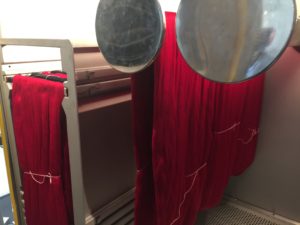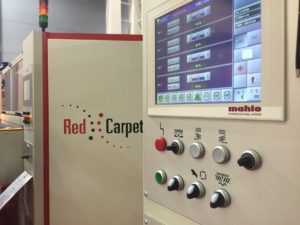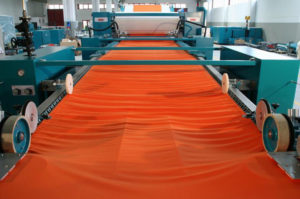Sustainability in the textile industry
ITMA 2015 showed how textile companies are today sensitive to sustainability by developing concrete solutions aimed at saving energy, water and recycling.
‘No hay un plan B para la Tierra’. This sentence scrolled in the video of the Antex, Biella company that produces machines for printing space-dyeing multicolored yarns, fabrics and garments, to highlight the innovative recovery plant cooling water of Conoprint 1/6c with six colors able to reduce fuel consumption of approximately 50%. In practice there was no exhibiting industry that had not made the theme of this ITMA 2015 dedicated to sustainable innovation in the textile and clothing. A concrete sign that anticipated with the resolutions made in words of the recent Paris Conference on climate.
Dyeing and finishing
Dyeing and finishing is a sector that traditionally requires huge water consumption. We mention the Dutch company Dye Cooche which aroused interest for their dyeing system without water. An innovative process that came ahead thanks to exceptional testimonials like Nike, Adidas and IKEA. The system of Dye Coo is based on the fact that at a certain pressure and temperature, the CO2 becomes supercritical, that is in an intermediate phase between liquid and gas in which the dyes dissolve very easily, better than in water. An operation in the absence of water and with 95% of the CO2 that is reused after each dyeing bath.
 For the dyeing of yarns, the Italian Cubotex presented Unimat, a machine capable of using a dye by means of a spray at 110 ° C that with a special circulation system allows a great saving of water in addition to obtaining excellent results even on delicate fibers.
For the dyeing of yarns, the Italian Cubotex presented Unimat, a machine capable of using a dye by means of a spray at 110 ° C that with a special circulation system allows a great saving of water in addition to obtaining excellent results even on delicate fibers.
Reduction of energy and water consumption even in finishing systems EFI Reggiani – which stand highlighted especially the new ReNOIR Next for printing with sublimation inks to which we refer in other article – which, with brands Mezzera and Jaeggli, offer global solutions for the whole process from processing of yarn to textile finishing. The new solutions from EFI Reggiani are based on technologies and processes that are aimed at reducing consumption and recycling of materials.
 Italian company Red Carpet successfully debuted with their new brand to introduce finishing solutions with their decatisers Power Wool and Wool Basic. In the model Wool BASIC, thanks to aspiration cylinders it is possible to adjust the fan speed by acting directly on the control panel. It thus makes more effective and precise the delicate operation of suction while reducing substantially the energy consumption. In addition, the electronic control system of the motorized cylinders EBRD also allows the recovery of the energy generated by the engine braking. The model Wool POWER then allows further savings thanks to an efficient treatment such as to allow the jump of the operations of KD light/medium conditions shortening the production cycle. In addition to energy saving, Red Carpet pays attention to the quality of the finished product enhancing the characteristics of each type of fibers arranging them for the steam treatment and, in the final decatising, it restores suppleness and force of the treated fabrics by removing the typical excess of glossy.
Italian company Red Carpet successfully debuted with their new brand to introduce finishing solutions with their decatisers Power Wool and Wool Basic. In the model Wool BASIC, thanks to aspiration cylinders it is possible to adjust the fan speed by acting directly on the control panel. It thus makes more effective and precise the delicate operation of suction while reducing substantially the energy consumption. In addition, the electronic control system of the motorized cylinders EBRD also allows the recovery of the energy generated by the engine braking. The model Wool POWER then allows further savings thanks to an efficient treatment such as to allow the jump of the operations of KD light/medium conditions shortening the production cycle. In addition to energy saving, Red Carpet pays attention to the quality of the finished product enhancing the characteristics of each type of fibers arranging them for the steam treatment and, in the final decatising, it restores suppleness and force of the treated fabrics by removing the typical excess of glossy.
Flainox introduced the new seires of machines NRG – “USK” for garments dyeing. These allow to reduce 25 percent of energy consumption and up to 70 percent of water, steam and chemicals consumption. With the function Eco-rinse water leaving the exchanger can be fed into the machine in order to contribute to the reduction of temperature and to start the first washing stage. A special monitoring kits, utilities saving kit consumption of steam – water – electricity are kept under control and optimize the dyeing / washing cycle.
An innovative process for post-treatment in dyeing with reactive dyes, is ReactEVO proposed by ERCA. ReactEVO substantially reduces the consumption of water and the treatment time, while improving the fastness. We talk about energy savings of 70 percent, water by 50 percent and time in the order of 20 percent, as told us Roberto Ghioldi, sales manager of ERCA. The company is also the first Italian partner og Bluesign System that ensures the sustainability of textiles and consumer safety.
Innovative systems from Albini Energia for heat recovery in turnkey production plants, with a patented heat exchanger with automatic cleaning system, able to remove impurities in the waste water. In the textile field the heat recovery on continuous machines is not always realized precisely because of the difficulties in the management of the impurities and the products present in the effluent. The exchanger Albini Energy is designed to allow heat exchange efficiency higher than 85 percent, with the removal of any deposits on the walls. To improve its effectiveness was added to an input of steam inside the surge tank which brings to temperature the washing solution improving the yield. The system presented at the fair has been designed for a large spinning plant in Vietnam.
Fabric preparation
 For the preparation of the fabrics the Italian company Lafer, realized an economic system with zero emissions to remove oils from the fabrics made of synthetic fibers and a system of hot air drying with wind tunnel effect, without the use of water and with a 90 percent reduction of energy required for washing; Furthermore, the system of recirculation and filtration in closed circuit allows the recovery of 99 percent of the solvents. Among the solutions for the treatment of cotton fabrics with no environmental impact, has been pointed to the cleaning system dry ‘Dissolve’ with a process to liquid ammonia is now available for denim and knitted fabrics.
For the preparation of the fabrics the Italian company Lafer, realized an economic system with zero emissions to remove oils from the fabrics made of synthetic fibers and a system of hot air drying with wind tunnel effect, without the use of water and with a 90 percent reduction of energy required for washing; Furthermore, the system of recirculation and filtration in closed circuit allows the recovery of 99 percent of the solvents. Among the solutions for the treatment of cotton fabrics with no environmental impact, has been pointed to the cleaning system dry ‘Dissolve’ with a process to liquid ammonia is now available for denim and knitted fabrics.
The choice of liquid ammonia is a response to market needs to provide greater softness, and better maintenance of tissues. The process comprises a step of impregnation with recovery of 95% of the ammonia, with evaporation of the remaining 5% neutralization and deodorization.
For the treatment of fabrics with reduction of energy consumption and costs of chemicals and increase productivity, we mention the innovative “Textile Spray Application System” by Baldwin that through the use of nozzles with precision valves reduces the impact on the environment in production processes. This technology used for over 30 years in the printing industry, where Baldwin is the market leader, is used in the process of finishing in the textile industry or in the pre-treatment of fabrics for digital printing. The system allows a reduced consumption of chemicals and water, and of the electrical energy needed for drying subsequent to the treatment by increasing the production speed and freeing the plant for further processes. Another feature is the ability to apply different products simultaneously on the surface on both sides, or “wet on wet”.
Indian Geratex Machinery Company, introduced an innovative system for sustainable mercerizing, bleaching, desizing and washing with Ultra Sonic technology based on ultrasonic waves which accelerate the water molecules in the bath, practically at the speed of sound, thus creating an effect of turbulence in the machine and allows it to complete the entire cycle in half the time compared to that used by existing technologies. This allows a reduction of water and chemicals and less energy consumption. According to engineers of Geratex system saves about 20-30% of chemicals, 25-35% water and 30-35% energy savings.
Spinning
Fadis Spa, that at ITMA has celebrated 55 years of activity, is one of the promoters of the project “Sustainable Technologies” in which companies need to gear up to provide solutions that place the center of the production process, the reduction of energy, water and chemicals to a cycle production frugal the environment. From here the series Sincro machine which allows a reduction of energy consumption even higher than 12 percent and then a release into the air of lower CO2 and a significant savings in energy costs. Moreover, all its machines “Green Label” each customer can test the input of CO2 into the atmosphere per kg product.
Energy saving at Saurer, as pointed Martin Folini, CEO of Saurer Group, operating both in terms of economy, and in terms of ergonomics. Specifically, the Swiss company has introduced a new generation of clarifiers for yarns, developed in joint venture with the Indian Premier Evolvics, which gave birth to the Saurer Premier Technologies.
A saving of 66% of energy in spinning able to reduce production costs by 11% is what you get with Zinser 72, while Autocoro 9 with its automatisms would provide a 30% greater productivity.
Globally speaking we deserve a nod, which will deepen, purification plants and water recycling in large textile factories made turnkey Europrogetti of Padua. These installations to exhaust “0” allow the recovery on three levels, 90%, 95% and 97.5%, with the prerogative that the greater the effectiveness, ie more is regenerated, the lower the cost in time to service the ‘plant, up to a recovery of the investment over the years.






